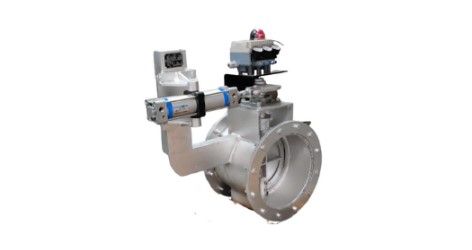Understanding Industrial Dampers: Importance and Applications
Understanding Industrial Dampers: Importance and Applications
Blog Article
Introduction:-
In industrial machinery and HVAC systems, certain components often go unnoticed despite playing critical roles in ensuring efficient operations. One such essential yet underrated element is the industrial damper. These seemingly simple devices are integral to controlling airflow, pressure, and temperature in various industrial settings. Let’s delve into the importance and diverse applications of industrial dampers.

What Are Industrial Dampers?
Industrial dampers, also known as airflow control dampers or air flow regulators, are mechanical devices designed to regulate the flow of air or gases within ducts, chimneys, and ventilation systems. They come in various types, including butterfly dampers, louvers, radial vane dampers, and more. Each type serves specific purposes and operates differently based on the intended application.
Importance of Industrial Dampers
1. Airflow Control: Industrial processes often require precise control over airflow to maintain optimal conditions. Dampers enable engineers to adjust airflow rates, ensuring efficient operation of heating, ventilation, and air conditioning (HVAC) systems, as well as industrial processes like combustion, drying, and ventilation.
2. Pressure Regulation: Dampers play a crucial role in maintaining the desired pressure levels within ducts or systems. By adjusting the damper position, operators can modulate pressure to meet the requirements of different processes, preventing over-pressurization or under-pressurization that could compromise safety and performance.
3. Temperature Management: Controlling temperature is essential in various industrial processes, including heat treatment, drying, and cooling. Dampers facilitate temperature regulation by allowing operators to adjust airflow, which directly impacts the temperature within ducts or equipment.
4. Energy Efficiency: Properly designed and installed dampers contribute to energy efficiency by optimizing airflow and reducing energy consumption. By controlling the volume and direction of airflow, dampers help minimize energy losses associated with heating, cooling, and ventilation systems, thereby lowering operational costs and environmental impact.
5. Safety and Environmental Compliance: In industrial settings, maintaining safe operating conditions and complying with environmental regulations are paramount. Dampers assist in achieving these objectives by controlling emissions, preventing the release of harmful gases, and ensuring proper ventilation to remove contaminants from work areas.
Applications of Industrial Dampers
1. HVAC Systems: Dampers are widely used in heating, ventilation, and air conditioning systems to regulate airflow and temperature within buildings. They help distribute conditioned air evenly throughout the space, ensuring occupant comfort and energy efficiency.
2. Industrial Ventilation: In manufacturing facilities, warehouses, and industrial plants, dampers are employed to exhaust fumes, dust, and other airborne contaminants. They also facilitate fresh air intake to maintain safe indoor air quality and regulate temperature and humidity levels.
3. Combustion Systems: Dampers play a crucial role in combustion processes, such as those in boilers, furnaces, and incinerators. They control the supply of air or fuel to the combustion chamber, optimizing combustion efficiency and ensuring safe operation.
4. Process Control: Various industrial processes, including chemical manufacturing, food processing, and pharmaceutical production, require precise control over airflow and temperature. Dampers are utilized in these applications to regulate process parameters and maintain product quality and safety.
5. Environmental Control: Dampers are integral to environmental control systems, such as those in wastewater treatment plants, power plants, and pollution control facilities. They help manage emissions, regulate airflow in ducts and stacks, and ensure compliance with environmental regulations.
Conclusion
Industrial dampers may seem like simple components, but their significance in ensuring efficient airflow control, pressure regulation, and temperature management cannot be overstated. From HVAC systems to industrial processes, these devices play diverse roles in optimizing performance, enhancing safety, and promoting energy efficiency. Understanding the importance and applications of industrial dampers is essential for engineers, facility managers, and industry professionals seeking to improve operational efficiency and meet regulatory requirements in various industrial settings.
Report this page